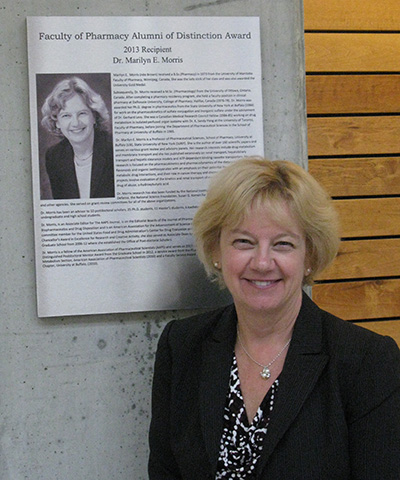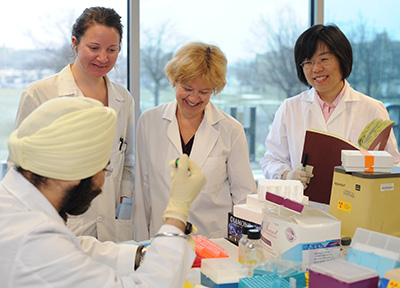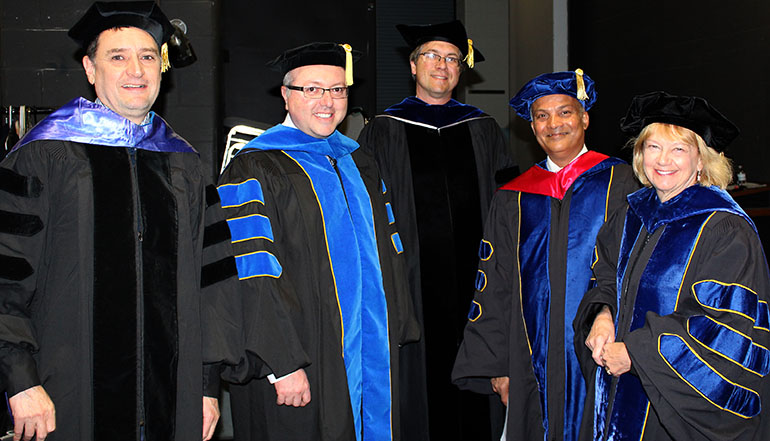 Volunteering with AAPS, Marilyn Morris has made lasting contacts and friends.
Volunteering with AAPS, Marilyn Morris has made lasting contacts and friends.
By Linda C. Brown
At the 2018 PharmSci 360, Marilyn E. Morris, Ph.D., received the AAPS Distinguished Service Award to recognize and thank her for a lifetime of service to the American Association of Pharmaceutical Scientists (AAPS). A former AAPS president, Morris confesses that she never had a career plan.
“I know what I enjoy in my career and have tried to stay that path. I enjoy research, teaching, and interacting with students, postdocs, and other scientists,” she says. As a volunteer with AAPS, Morris had the opportunity to interact with students and scientists from around the globe.
Journey with AAPS
Morris’ involvement with AAPS began in 1985 when she participated in the straw vote at the American Pharmacists Association meeting in Minneapolis in favor of forming a new scientific organization for pharmaceutical scientists.
When Morris became more involved with AAPS, she admits that she was surviving day by day. She held a demanding faculty position and was raising three daughters. She tested the waters of involvement by accepting some committee assignments for the Pharmacokinetics, Pharmacodynamics, and Drug Metabolism (PPDM) section around 1990. Initially she focused on topics related to her academic career: new academic programs, graduate education, abstract review, the PPDM Research Achievement award selection committee, eventually moving from committee member to committee chair. She also became an Executive Committee member of the newly formed Drug Transporter focus group.
She then felt ready to commit to a two-year term as secretary treasurer for PPDM. In that role, she met a number of really interesting and dedicated people and enjoyed her interactions with PPDM leaders and made friends. “We were working together toward the same goals for the membership and making a difference with new programs, annual meeting programming, and workshops,” she says. “So, it was the people and a sense of contributing to our profession.”

Midterm Meeting of the International Pharmaceutical Federation Board of Pharmaceutical Sciences in Amsterdam.
Working with her fellow PPDM members led Morris to run for PPDM chair, a 4-year commitment, which would mean spending a total of 6 years as a PPDM section leader. She was hooked. When asked to run for member-at-large as part of the AAPS Executive Council, a 3-year commitment, she went for it and loved it. “I really recommend this position,” she says. “You get to interact with section leaders in all areas and contribute to different committees, programming, and new initiatives.”
Her experience as a member-at-large led to running for AAPS President-Elect, committing to a 3-year term of President-Elect, President, and Past-President. “It was a chance to interact with many talented scientists and AAPS staff, to make a difference, and to move AAPS and our profession forward, again, working toward common goals,” she says.
What she found most valuable during her year as president was getting to know better the section leaders so they could work together more effectively. “I now know the face that goes with the voice on the teleconference. I got to meet, talk with, tour with, and have breakfast, lunch, and dinner with a lot of motivated, dedicated, and fun-loving people. They are all volunteers.” In addition, many of the association’s goals were really important to her, such as elearning, enhancing research funding and graduate education, and international outreach.
Looking back at her service to AAPS, Morris says, “I don’t regret a day.” While participating in AAPS took time away from writing grants and manuscripts, she learned a lot about the pharmaceutical sciences, about management, and about leadership. And she met a lot of pharmaceutical scientists and made lasting contacts and friends.
“Get involved,” she encourages. “Personally and scientifically, it is fulfilling. I believe we can all make a difference. Some commit their time and effort to making that difference, and maybe, like me, they get a lot more back—friends and colleagues and maybe even the knowledge that they initiated or contributed to a new program or way of doing things that in some way (be it ever so small) that has benefited our profession. However, if you volunteer, be prepared to spend the time and contribute.” Among the many benefits Morris names for joining a professional society are the scientific programs, networking, student support, career opportunities, professional development, opportunities for leadership, and professional recognition.
In addition to receiving the AAPS Distinguished Service Award, Morris was designated an AAPS Fellow in 2003, received an Innovation in Biotechnology award at the National Biotechnology Conference in 2015, and was honored with the Research Achievement Award in PPDM in 2016. You can
watch Morris accept her Distinguished Service Award.
 2013 Faculty of Pharmacy Outstanding Alumni Award, University of Manitoba, Canada.
2013 Faculty of Pharmacy Outstanding Alumni Award, University of Manitoba, Canada.
Women in the Pharmaceutical Sciences
Morris joined the Department of Pharmaceutical Sciences at the University at Buffalo in 1985 as their first woman faculty member. In 1990, she submitted programming for the annual meeting to establish the first women’s forum. She says, “I felt there was a need for a women’s forum to discuss professional development. There were a lot fewer women members in AAPS or in the profession at that time, and I organized the first women’s forum with my friend and colleague, Gayle Brazeau, Ph.D.” Morris has continued working on creating forums for women, for example, the session at the 2014 AAPS Annual Meeting and Exposition called Women in Pharmaceutical Sciences—Career Development Facts, Myths, and Tips. Many very capable women have taken the lead in this area now, and these forums continue to attract many women participants.
 Morris with Graduate Students
Morris with Graduate Students
Research and Mentors
Morris works in the area of drug transporters: their influence on pharmacokinetics and pharmacodynamics and their role as therapeutic targets. She began in the area of drug metabolism during her doctoral research on sulfate conjugation and the influence of inorganic sulfate in this metabolic pathway under the mentorship of Gerhard Levy, Ph.D., at the University at Buffalo. She continued working with drug conjugation during her postdoctoral fellowship at the University of Toronto with K. Sandy Pang, Ph.D. “When I began a faculty position in 1985, I wanted to understand inorganic sulfate homeostasis, since inorganic sulfate availability is a determinant of sulfate conjugation, and this led to my first studies on membrane transport of inorganic sulfate,” she says. “I characterized the sodium-sulfate cotransporter and performed many studies in this area, including regulation and disease effects. There was very little information at that time on the membrane transport of endogenous or exogenous (drug) compounds. This really was the start of my career with membrane transporters.”
At the University of Manitoba, Morris was involved in undergraduate research as a pharmacy student under the mentorship of Colin Briggs, Ph.D. “That really started my interest in research and going on to further training,” she says. She completed a Pharmacy Residency program and M.Sc. in pharmacology and became a faculty member in clinical pharmacy at Dalhousie University in Nova Scotia. “It was here that I knew I loved the academic environment and that I needed to go on to a Ph.D.,” she says. “I was fortunate to be accepted as an international student at the University at Buffalo and to have Gerhard Levy, Ph.D., as my doctoral advisor. He was inspirational and a role model that shaped my career.”
 Morris with colleagues at University at Buffalo commencement 2018
Morris with colleagues at University at Buffalo commencement 2018
Success and Leadership
When giving advice, Morris tells her students that the two most important characteristics of a successful graduate student are hard work and a good attitude. The biggest lesson she has learned is, “You cannot be afraid of change or taking risks; you are always learning.” She counsels her students to keep an open mind, embrace change, and value the opinions of others.
Morris prefers to lead by example and to listen to and empower others. Both her experience on the faculty of the University at Buffalo and serving on committees at AAPS have helped her be a good manager and demonstrate leadership. “While it is important to have a vision for an organization,” she says, “it is equally important to ask for input and create a culture where all feel that their ideas and contributions are valued. It is important to allow others to provide leadership.”
She describes a good leader as “a good listener, a good communicator, someone who respects and values those working for her, someone who cares about the organization and is willing to invest the time and effort to move the organization forward.”
Looking to the Future
As a State University of New York Distinguished Professor and Chair, Morris still looks to the future and things she wants to accomplish. “As chair of my department at the university, I am focusing on increasing faculty, grant support, and recognition/ranking,” she says. “I would like to obtain a T32 graduate student training grant for the department. As a researcher, I have several very interesting projects ongoing that I feel will have scientific and clinical impact.” Sounds like a plan.